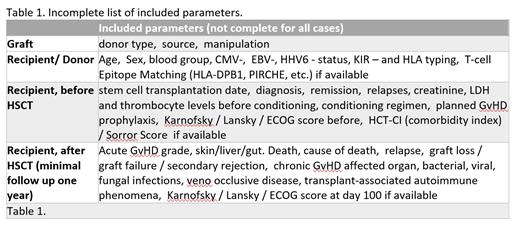Background: There is no reliable way to predict the individual risk of suffering from relevant complications during the course of Hematopoetic Stem Cell Transplantation (HSCT), because the huge amount of multidimensional parameters influencing clinical outcome is impossible for a human to compute accurately.
Reliable prediction of complications: supports patients and physicians to make informed decisions, simplifies choosing best matched HSCT donors to avoid complications and enables superior, individualized planning of conditioning and prophylaxis. Up to now prediction is not based on evidence but rather experience, which differs amongst physicians.
MatchGraft.AI is an artificial intelligence based machine learning tool that predicts the individual risk of acute Graft versus Host Disease, recurrence of basic disease and overall risk of death, using only pre transplant data (Table 1). The model was trained and tested on retrospective data of an international, multicenter cohort.
Aim: Explore standard of care of choosing an HSCT donor and compare choice with real world data and MatchGraft.AI.
Method: We developed an electronic questionnaire with 200 short patient histories including all parameters Matchgraft.AI is using. Pediatric and adult, benign and malignant cases with different donor types (matched unrelated, matched sibling, haploidentical family donor) are represented. This real world data is derived from a retrospective cohort of pediatric and adult patients of Charité Universitätsmedizin. 50 international experts in HSCT will: 1. choose a donor 2. predict individual risk of acute Graft versus Host Disease, risk of relapse and overall death for 50 individual patients.
Cases are randomly allotted according to the physician's specialty (adult/pediatric treater, both). Questionnaires are anonymized. Answers are not traceable to the expert. Personal results compared with real world outcome and MatchGraft.AI can be provided to participants, if they wish.
Results: We compare sensitivity and specificity of MatchGraft.AI to the standard of care, which is expert opinion and real world outcome.
We examine: 1. whether the choosing of a donor is dependent on the individual physician or consistent throughout different HSCT experts. 2. how precise HSCT experts can predict the occurrence of severe complications for patients planned to undergo HSCT. 3. how well MatchGraft.AI can predict the occurrence of severe complications for patients planned to undergo HSCT in comparison.
Conclusion: This study will provide important data about the standard of care in HSCT donor choosing and for the planned prospective study evaluating MatchGraft.AI.
Disclosures
Reschke:Berlin Institute of Health at Charité - Universitätsmedizin Berlin: Current Employment. Gross:Berlin Institute of Health at Charité - Universitätsmedizin Berlin: Current Employment. Seiler:2. Berlin Institute of Health at Charité - Universitätsmedizin Berlin: Current Employment. Sürücü:Charité: Current Employment. Penack:Charité: Current Employment. Weschke:Berlin Institute of Health at Charité - Universitätsmedizin Berlin: Current Employment. Higgins:Berlin Institute of Health at Charité - Universitätsmedizin Berlin: Current Employment. Oevermann:Charité: Current Employment.


This feature is available to Subscribers Only
Sign In or Create an Account Close Modal